Laguna Beach High School Gets in the FLOW of Environmental Literacy
Key Points
-
Cohesive and articulate branding can help both students, staff and community familiarize themselves with a new initiative and can create alignment in implementation.
-
Connecting students with real-world problems in their own community is a great way to discover purpose and learn new skills.
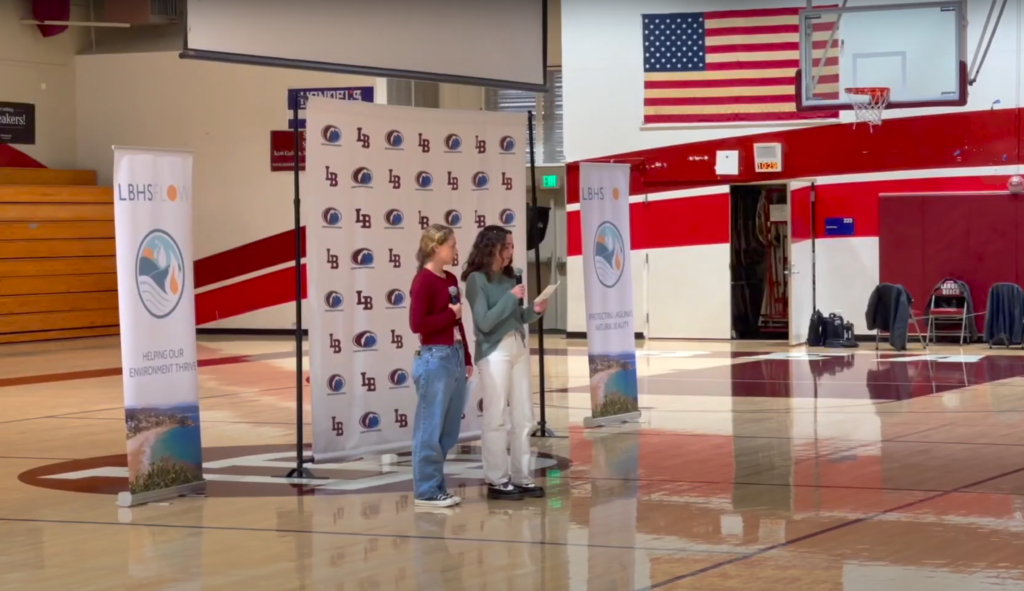
A foundational tenet of problem and project-based learning is having students address real-world problems. The students and staff at Laguna Beach High School have unearthed the natural FLOW of how to spot local challenges and equip learners with the tools, dispositions and opportunities to grapple with them.
FLOW stands for Fire, Land, Ocean and Water which are four environmental issues particularly relevant to the Laguna Beach community. FLOW also represents a cross-curricular and school-wide effort to connect curriculum and students to environmental problems and potential solutions that affect them directly.
FLOW began in 2018 when two Laguna Beach High School English teachers sought to integrate more writing for students in other disciplines. After reflecting on how many college professors select topics for reading and inquiry that often become foundational for many freshmen classes, they believed that this provided common ground in providing students topics for discussion and writing.
“We decided to adopt this approach for our high school students and began researching and brainstorming topics that would make the most sense for our students at Laguna Beach High School,” said Founding English Teacher and FLOW Coordinator Sarah Benson. “Eventually, we decided that the unique environmental landscape of Laguna Beach would work well. To make a sustainable program that would work across four grade levels, we landed on FLOW,” she said.
Now, Benson has been joined by her co-coordinator and Ed Tech Teacher on Special Assignment Jun Shen. He said he has added a greater technology and PBL focus to FLOW.
“I worked with Sarah to incorporate more real-world experiences and authentic assessments into the FLOW curriculum,” said Shen. “We also increasingly focused on public relations and branding to make FLOW recognizable in our community.”
The FLOW Program is completely voluntary for teachers, according to Benson and Shen.
“We prefer an organic approach to building the program as opposed to a forced mandate,” said Benson. “We felt this would make the experiences for students more rich and valuable.”
Shen said that about half of the teachers have connected to FLOW in some capacity. He said some teachers refer to FLOW casually during the natural progression of their specific curricular content, while others are developing entirely new units and projects based on FLOW.
Shen said that one important opportunity for teachers to become involved in FLOW is through Unit Design, a district initiative in which teachers are paid for 20-30 hours of professional development to recreate curricular units to be more real-world relevant and authentically assessed.
“Many teachers from K-12 incorporate FLOW themes into their redesigned units, leading to vastly increased vertical and horizontal articulation across the district,” said Shen.
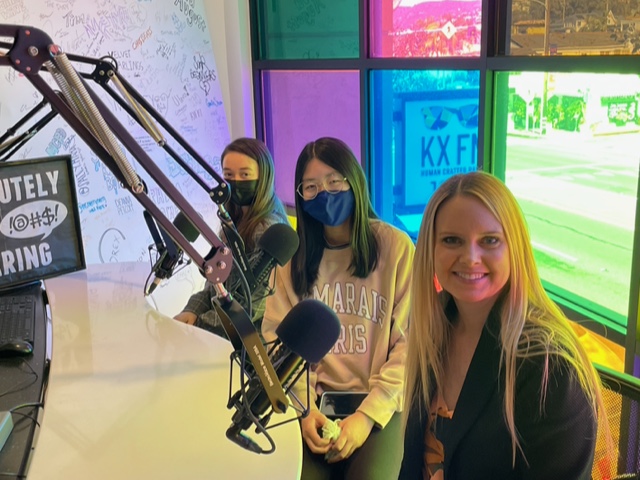
To see how FLOW has been connecting across the curriculum and district, see Laguna Beach Cross Curricular. In addition to English, Shen highlighted some great video examples from other disciplines including Art, Marine Ecology and Model United Nations.
FLOW launches each year in November with the official FLOW Week. Students have field trips throughout the year, a FLOW English unit in January, integrated FLOW content in other classes throughout the year and a variety of culminating experiences.
These final presentations vary by grade level, according to Shen. For example, Shen said that 9th graders published digital journalism anthologies and two students presented their work on a local radio station. 10th graders created poetry books which were published in the district’s digital library and selected students read their poems to middle school English classes. Juniors produced ocean-themed films and finalists were screened at the first FLOW Film Showcase in front of an expert panel of industry professionals. Additionally, all finalists were entered into the Coast Film and Music Festival in Laguna Beach. Finally, 12th graders created video resumes in which they applied to non-profit organizations of their choice. Selected seniors then presented their videos to panels of district office staff.
Benson said that student feedback has been extremely positive.
“Students like the real world, authentic learning experiences and the greater community often report that they are inspired by the student work,” said Benson.
Sophomore Zoe Tran – whose 9th grade English FLOW project focused on Laguna Beach wildfires and landed her an appearance on a local radio station – said that the process was an eye-opener for her and her peers and allowed them to tap into their collective creativity.
“The FLOW unit was a really unique and great way to be more connected to our community,” said Tran. “I feel that it definitely made my peers and myself more aware of and concerned about sustainability and the effect of environmental disasters.”
Senior Ranen Seeck said that the FLOW experience has truly shaped his passion for sustainability. He worked with a local organic farmer to create, present and distribute a sustainable gardening guidebook.
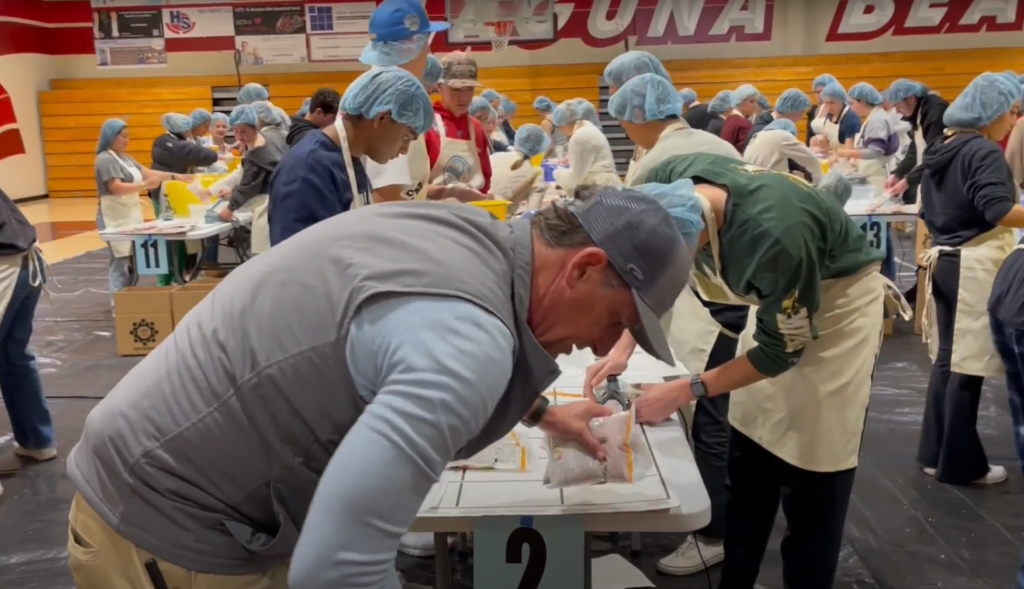
“FLOW has provided students like me a platform to actively contribute to my school and community,” said Seeck. “With the support of my project mentor, I have been part of promoting a culture of sustainability beyond Laguna Beach.”
There have been many noteworthy projects, according to the FLOW Coordinators. Examples include a water-themed mobile learning museum created for a local elementary school, a Rain Barrel Auction and a redesign of the senior quad planter seen here. Last May, Laguna Beach High School had its annual Senior Service Day where all of the seniors packed 70,000 meals to be shipped to Zambia.
Looking ahead, the FLOW Coordinators see even more students and staff getting involved. They are excited about the school and district’s commitment to FLOW as evidenced by a new district-level coordinator position for Environmental Literacy. Her name is Gloria Harwood and the coordinators said she is supporting FLOW-related curriculum across the district and promoting FLOW as a key theme for the Unit Design Process.
Harwood said she is proud and inspired to be part of FLOW and is excited that a new board resolution was passed dedicated to environmental literacy, climate action and sustainability throughout the district.
“FLOW is a standout program that connects across the curriculum while also promoting stewardship and real-world problem-solving within the classroom,” said Harwood. “At the district level, we see FLOW as an integral part of environmental literacy in the classroom and will continue to support potential programs and projects in the future.”
Shen said that he and the entire FLOW team feel very fortunate to work for a district that encourages teachers to take chances and initiate change.
“The environment is part of Laguna Beach’s DNA and it naturally lends itself to being a unifying force for our schools, civic institutions and commerce,” said Shen. “We encourage different schools to tap into the pertinent issues in their surrounding communities when thinking of doing something similar to FLOW.”
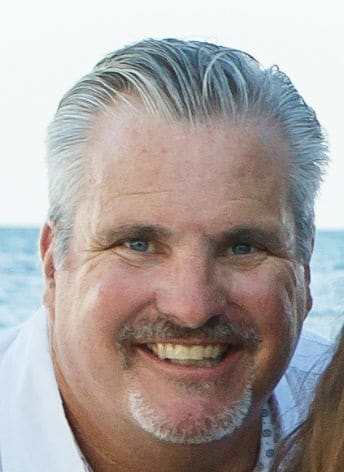




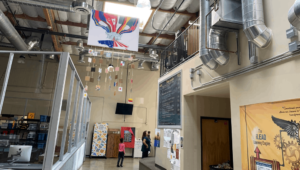

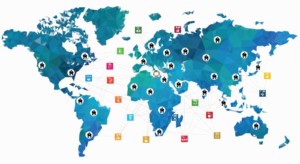
0 Comments
Leave a Comment
Your email address will not be published. All fields are required.